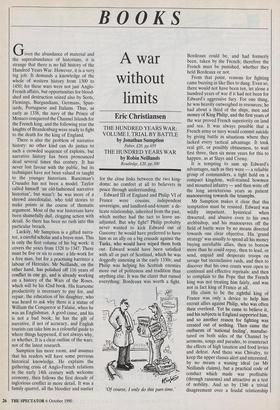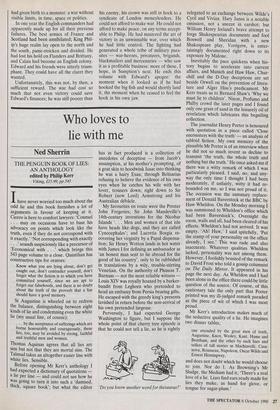BOOKS
A war without limits
Eric Christiansen
THE HUNDRED YEARS WAR: VOLUME I, TRIAL BY BATTLE by Jonathan Sumption Faber, £20, pp.659 THE HUNDRED YEARS WAR by Robin Nei!lands Rout/edge, £20, pp.300 Given the abundance of material and the superabundance of historians, it is strange that there is no full history of the Hundred Years War. However, it is a very big job. It demands a knowledge of the whole of western history from 1300 to 1450; for these wars were not just Anglo- French affairs, but opportunities for blood- shed and destruction seized also by Scots, Flemings, Burgundians, Germans, Span- iards, Portuguese and Italians. Thus, as early as 1338, the navy of the Prince of Monaco conquered the Channel Islands for the French king, and the following year the knights of Brandenburg were ready to fight to the death for the king of England.
There is also the problem of narrative history: no other kind can do justice to such a crowded sequence of exploits, but narrative history has been pronounced dead several times this century. It has never lost favour with the public, but its techniques have not been valued or taught to the younger historians. Runciman's Crusades has not been a model. Taylor called himself 'an old-fashioned narrative historian', but wasn't: he was more of a shrewd anecdotalist, who told stories to make points in the course of thematic argument. Most of the war historians have been shamefully dull, clogging action with detail. So there has been no rush into this particular breach.
Luckily, Mr Sumption is a gifted narra- tor, a careful scholar and a brave man. This is only the first volume of his big work: it covers the years from 1328 to 1347. There must be five or six to come: a life-work for a free man, but for a practising barrister a labour of Hercules. Mr Neillands, on the other hand, has polished off 116 years of conflict in one go, and is already working on a history of the Wars of the Roses, which will be his 42nd book. His fearsome productivity is necessary to pay for, and repair, the education of his daughter, who was heard to ask why there is a statue of William the Conqueror at Falaise, when he was an Englishman. A good cause, and his is not a bad book; he has the gift of narrative, if not of accuracy, and English tourists can take him as a colourful guide to where things happened, if not always why, or whether. It is a clear outline of the wars: not of the latest research.
Sumption has more room, and assumes that his readers will have some previous historical knowledge. He explains the gathering crisis of Anglo-French relations in the early 14th century with welcome economy, then follows the first decade of inglorious conflict in more detail. It was a family quarrel, all the bloodier and nastier for the close links between the two king- doms: no comfort at all to believers in peace through understanding.
Edward III of England and Philip VI of France were cousins, independent sovereigns, and landlord-and-tenant: a de- licate relationship, inherited from the past, which neither had the tact to leave un- adjusted. But why fight? Philip probably never wanted to kick Edward out of Gascony: he would have preferred to have him as an ally on a big crusade against the Turks, who would have wiped them both out. Edward would have been satisfied with all or part of Scotland, which he was doggedly annexing in the early 1330s; and Philip was helping his Scottish enemies more out of politeness and tradition than anything else. It was the claret that ruined everything: Bordeaux was worth a fight.
'Of course, I only do this part-time.' Bordeaux could be, and had formerly been, taken by the French; therefore the French must be punished, whether they held Bordeaux or not.
From that point, reasons for fighting came buzzing in like flies to dung. Even so, there would not have been ten, let alone a hundred years of war if it had not been for Edward's aggressive fury. For one thing, he was heavily outweighed in resources; he had about a third of the ships, men and money of King Philip, and the first years of the war proved French superiority on land and sea. It was always possible that a French army or navy would commit suicide by giving battle in situations where they lacked every tactical advantage. It took real grit, or possibly obtuseness, to wait first three, then six more years for this to happen, as at Sluys and Cressy.
It is tempting to sum up Edward's advantages, such as they were — a reliable group of commanders, a tight hold on a compact kingdom, well-trained bowmen and mounted infantry — and then write off the long unvictorious years as patient manoeuvring towards the triumphs.
Mr Sumption makes it clear that this temptation must be resisted. Edward was wildly impatient, hysterical when thwarted, and abusive even to his own archbishop, and his manoeuvres off the field of battle were by no means directed towards one clear objective. His 'grand strategy' was usually to spend all his money buying unreliable allies, then to borrow more than he could repay, then to lead, or send, unpaid and desperate troops on savage but inconclusive raids, and then to discover that his own coasts were open to continual and effective reprisals: and then to complain to the Pope that the French king was not treating him fairly, and was not in fact king of France at all.
His claim to be the rightful king of France was only a device to help him recruit allies against Philip, who was often their overlord. Yet he came to believe it, and his subjects in England supported him, and so another reason for fighting was created out of nothing. Then came the outbursts of 'national feeling', manufac- tured on both sides of the Channel by sermons, songs and parades, to counteract the effects of high taxation and food levies and defeat. And there was Chivalry, to keep the upper classes alert and interested, by no means a waning ideal (as Mr Neillands claims), but a practical code of conduct which made war profitable (through ransoms) and attractive as a test of nobility. And so by 1346 a trivial disagreement over a feudal relationship had given birth to a monster: a war without visible limits, in time, space or politics.
In one year the English commanders had apparently made up for all their previous failures. The best armies of France and Scotland had been annihilated; King Phil- ip's huge realm lay open to the north and the south, panic-stricken and divided. He had lost his hold on Flanders and Brittany, and Calais had become an English colony. Edward and his friends were utterly trium- phant. They could have all the claret they wanted.
Unfortunately, this was not, by then, a sufficient reward. The war had cost so much that not even victory could save Edward's finances; he was still poorer than his enemy, his crown was still in hock to a syndicate of London moneylenders. He could not afford to make war. He could not afford to make peace, on any terms accept- able to Philip. He had mastered the art of victory in an unwinnable war, over which he had little control. The fighting had generated a whole tribe of military para- sites — war-heroes, privateers, brigands, blackmailers and mercenaries — who saw it as a profitable business: more of these, I hope, in Sumption's next. He ends this volume with Edward's apogee: the moment when it looked as if he had hooked the big fish and would shortly land it, the moment when he ceased to feel the hook in his own jaw.



















































 Previous page
Previous page